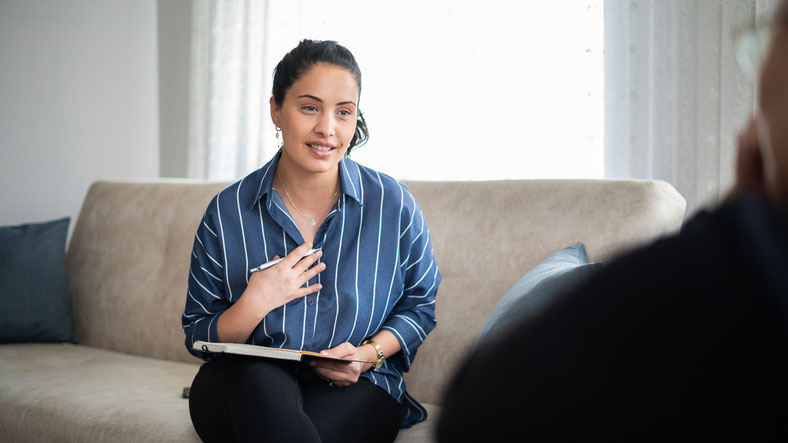Written by Sam Medley

According to the US Health Resources and Services Administration, there are over 200 communities throughout Florida that qualify as mental health workforce shortage areas.
This doesn’t just mean that patients are wait-listed before being able to see a psychiatrists or counselor. It means that even in the wake of large-scale natural disasters like hurricanes Milton and Helene when homes are lost and lives are completely disrupted, millions of Floridians are left without basic psychological supports of any kind…It means that many of the 21,000 children in Florida’s foster care system aren’t getting the support they need…It means that immigrants fleeing from unthinkable living conditions, violence, and poverty are alone in their fight to find security.
And for the 3 million adults and 225,000 children in the state who regularly battle mental health issues, it means that finding help is unlikely no matter where they turn.
But when dedicated social work students across Florida just like you make the decision to go all the way by earning clinically-focused MSW degrees, it brings about an incremental shift.
A snapshot taken in 2023 showed that a full 66% of Florida social workers specializing in mental health and behavioral disorders had taken the big step to earn a Master of Social Work (MSW) in preparation for that role.
What Does a Clinical Social Worker Do in Florida?

Licensed Clinical Social Workers (LCSWs) pull double-duty as generalist social workers with a scope of practice that includes mental health services.
Like any social worker, they connect people to life-saving services to ensure their basic needs are met. But unlike unlicensed social workers, they have the both the skill and the legal authority granted to them to perform clinical assessments, diagnose mental and behavioral health conditions including substance use disorders, develop treatment plans, provide psychotherapeutic (talk-therapy) treatment, and make referrals for more advanced clinical interventions.
With this advanced skill set, you’ll find LCSWs working in roles that include:
- Behavioral health therapists who help clients from all walks of life through trauma, mental health disorders, and more.
- Clinical managers who oversee teams of social workers, coordinate care between doctors and other professionals, and evaluate services.
- Community service directors who ensure the people in their communities, whether it’s a hospital or neighborhood, have access to appropriate resources.
- School social workers who help parents and teachers meet the physical, emotional, and developmental needs of students.
Of course, as a Licensed Clinical Social Worker, you’d also be a great fit for clinical counseling roles in mental health hospitals and outpatient clinics. But in Florida, you’ll also have options in an impressive number of non-traditional settings.
The work that you can do with an LCSW isn’t by any means restricted to clinical treatment, or even to clinical settings. Earning the LCSW simply expands your capabilities, opening the door to being able to work in high-demand and high-needs roles providing mental health services.
You might find yourself working for one of Florida’s Mobile Response Teams and helping people through crisis episodes when police response isn’t the best option. Or you might oversee one of the state’s many memory care communities staffed with geriatric social workers that cater to seniors with Alzheimer’s and dementia. Working directly with patients struggling with substance use disorders will definitely be in your wheelhouse. And if you’re around Miami or another major port, you can use your talents to help recent immigrants navigate the legal system, reconnect with their families, and overcome the many challenges that come with adjusting to a completely new way of life.
Becoming a Clinical Social Worker in Florida: Licensing Laws and Education Requirements
Many of Florida’s social services providers are private, nonprofit and charity organizations instead of the state government itself. This means that, for the most part, organizations set their own hiring requirements for many social service positions. The big exception to that, of course, would be for roles that involve anything that falls within the scope of clinical social work.
To ensure the safety of the public and uphold the integrity and professionalism of the healing arts in social services, the legal authority to provide clinical diagnosis and mental health services can only be granted by the state of Florida, and only to social workers who meet the strict standards for LCSW licensure.
The bottom line is – to perform clinical social work in Florida, you’ll have to become a Licensed Clinical Social Worker (LCSW) through the Florida Board of Clinical Social Work, Marriage & Family Therapy and Mental Health Counseling.
To qualify for the license, you’ll need to:
- Earn a Master of Social Work (MSW) through a program accredited by the Council on Social Work Education (CSWE)
- Complete two years of supervised work experience as a Registered Clinical Social Work Intern after graduation
- Take an eight-hour course on Florida law, a three-hour course on HIV and AIDS, and a two-hour course on domestic violence
- Pass the Association of Social Work Boards (ASWB) clinical exam
As rigorous as this sounds, Florida’s LCSW requirements are pretty similar to what you would find in other states. In fact, if you become an LCSW in another state, you may be able to qualify for licensure in Florida by endorsement. Assuming you’ve already earned an MSW, gained the necessary experience, and passed the ASWB clinical exam, you won’t have to start from scratch.
Specialized MSW Programs That Can Prepare You for Licensure
While you’ll need an MSW to become an LCSW in Florida, the Board has some specific educational requirements that will need to fit within your degree plan. The good news is that any CSWE-accredited clinically-focused MSW in Florida will build the curriculum to meet state requirements for 24 semester hours of classes on human behavior and clinical practice and take at least one class on psychopathology (the study of mental health). On top of that, your MSW program must include hands-on fieldwork experience before graduation.
Florida is full of MSW programs designed specifically to help you become an LCSW. Out of the 13 CSWE-accredited MSW programs in Florida, 11 offer clinically-focused degree specialties.
There’s Florida International University in Miami, which offers the opportunity to focus your practice even further with certifications in addiction, senior services, and child welfare that you can earn alongside the MSW. Or if you’re closer to Tampa, Southeastern University in Lakeland offers a faith-based clinical MSW program. And while there are more options scattered around the state, if relocating isn’t an option, plenty of Florida’s private and public universities offer online clinical programs, too.
Carving Out Your Clinical Specialty with Professional Certifications
When you become an LCSW, you’ll have an extremely valuable and versatile credential. But if you find yourself drawn to working with a specific population such as veterans or the unhoused, or you’re compelled to treat a particular behavior disorder such as addictions, earning a professional certification or two can be a great way to show your expertise.
Unlike the academic certificates described above that load-up your syllabus with more college courses focused in these niche areas and populations, professional certification is a continuing education and exam-based process that adds professional credentials widely recognized in the field.
You can think of academic certificates as a way to develop knowledge in a particular specialty, and professional certification as a way to both learn and demonstrate what you know to the professional community and patients.
Clinical Certifications You Can Get Through the National Association of Social Workers (NASW)
To start, you may want to consider many of the clinical certifications offered by the National Association of Social Workers (NASW). In addition to offering a Qualified Clinical Social Worker credential, they also offer certifications for LCSWs in gerontology, military social work, and substance use disorder treatment.
Exact qualifications vary, but for the most part, you’ll need an active clinical social work license, at least two years of work experience, and about 180 hours of specialty-specific continuing education hours. Considering you already need to complete continuing education hours to maintain your license, earning an NASW certification at the same time is a great way to make those hours count.
Clinical Certifications You Can Get Through the Florida Certification Board
The Florida Certification Board (FCB) is a nonprofit agency that certifies behavioral health professionals of all kinds in Florida. Some of their certifications are even required to hold specific positions in Florida’s social service network.
If you want to specialize in helping people through addiction recovery, the FCB’s Master’s Level Certified Addiction Professional (MCAP) credential would be a great fit. Typically, becoming an MCAP requires completing a few thousand hours of work experience, passing an exam, and fulfilling a number of other requirements. But because LCSWs have already gone through so much training, you can qualify for this certification with far fewer requirements.
Why Become an LCSW in Florida?

Becoming an LCSW in Florida is much more involved than becoming a more general social worker. So in a state where you can take on so many other rewarding roles without earning a license, why should you take all those extra steps?
Career Opportunities with Specialty Service Providers
Because LCSWs are so adept at meeting their clients’ mental health needs, organizations that serve high-needs populations often require all or most of their social workers to hold clinical licensure. But while all states have opportunities for LCSWs, Florida’s large and diverse population means it has more opportunities than most.
For instance, the nation’s largest VA health system is headquartered in Tampa and serves over a million veterans. People from all over the southeast travel to the Mayo Clinic in Jacksonville for its nationally-renowned care and cutting-edge medical technology… and the public school systems of Miami, Ft. Lauderdale, Tampa, Orange County, and Palm Beach are some of the largest in the nation.
All these organizations employ LCSWs to provide frontline services and oversee behavioral health programs.
However, Florida’s social service network isn’t made up of these major players alone. The Florida Department of Children and Families is supported by 18 regional Community-based Care Lead Agencies who provide life-saving services to the people in their areas. And those agencies are supported by smaller specialized agencies who serve immigrants, the victims of crime, seniors, children, and anyone else who needs help. No matter who you want to serve, there’s an organization in Florida that needs your drive and clinical expertise.
The State Is Taking Steps to Bolster Its Mental Health Workforce
While statistics about mental health care and access in Florida are grim, the state government and social work organizations across the state are taking steps to solve the issue.
And if you’re just getting into the field, this could result in some truly formative learning opportunities.
In early 2024, the Florida Senate passed SB 330. This bill allows the Agency for Health Care Administration to designate four behavioral health teaching hospitals. These hospitals will all have close ties to nearby universities so students can receive hands-on community-based training. Each hospital will also get $100 million a year to facilitate the program.
Excitingly, the University of South Florida in Tampa (a school with a CSWE-accredited MSW program) isn’t just participating — they’re getting additional funds to set up the Florida Center for Behavioral Health Workforce. The center will work closely with the state government and other stakeholders to solve issues related to behavioral health workforce development.
Even if USF isn’t on your radar, SB 330 leaves room for the state to designate more behavioral health teaching hospitals over the next two years. And with the Florida Center for Behavioral Health Workforce working diligently to support LCSWs and other behavioral health professionals, there will almost certainly be even more learning and career opportunities for clinical social workers in the very near future.
